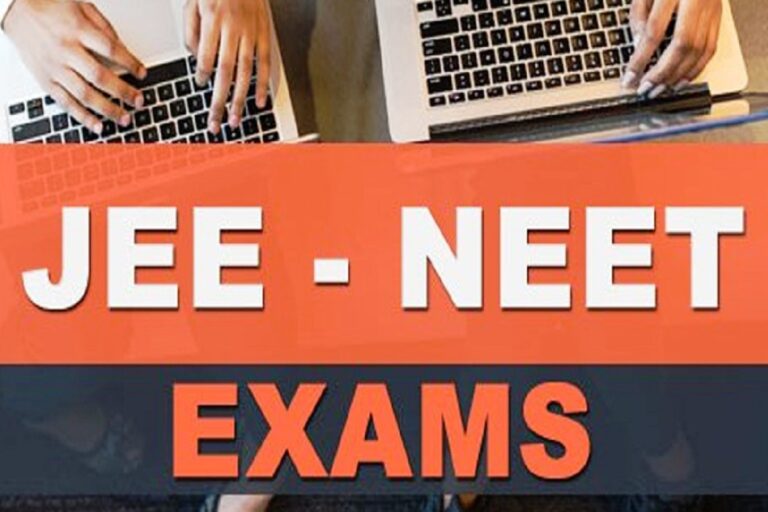There’s always a confusion particularly among Standard 12 students regarding which field to choose while comparing engineering and medical. Both these national-level qualifying competitive exams are so popular and troublesome to crack. Whichever you wish to select, it’s exceptionally vital to be mindful of the difference between what is JEE and NEET exams.
All About JEE
Introduction
JEE, short for Joint Entrance Examination, is a national-level entrance examination conducted in India for students who wish to get admitted in undergrad engineering or architecture programs at the Indian Institutes of Technology (IITs), National Institutes of Technology (NITs), Indian Institutes of Information Technology (IIITs), and other government-funded engineering colleges in India.
Syllabus
Before starting your IIT JEE preparation, you ought to know what to study. All the students preparing for JEE should study the topics from the syllabus to perform well in the examination. The IIT JEE exam syllabus comprises the topics/concepts of Mathematics, Physics and Chemistry from Standard 11th and 12th. As a JEE aspirant you need to learn topics, understand concepts and practice well as per the syllabus.
The syllabus for the JEE exam is vast and covers topics in physics, chemistry, and mathematics. Here is a detailed overview:
Physics:
- Mechanics: Laws of motion, kinematics, work-energy theorem, rotational motion, gravitation.
- Thermodynamics: Laws of thermodynamics, heat transfer, kinetic theory of gasses.
- Electromagnetism: Electrostatics, current electricity, magnetic effects of current, electromagnetic induction.
- Optics: Ray optics, wave optics.
- Modern Physics: Dual nature of matter and radiation, atomic and nuclear physics.
Chemistry:
- Physical Chemistry: Atomic structure, chemical bonding, thermodynamics, chemical equilibrium, electrochemistry, chemical kinetics.
- Inorganic Chemistry: Periodic table, chemical bonding, coordination compounds, metallurgy.
- Organic Chemistry: General organic chemistry, hydrocarbons, organic compounds containing oxygen and nitrogen, polymers, biomolecules.
Mathematics:
- Algebra: Quadratic equations, sequences and series, complex numbers, matrices, determinants.
- Trigonometry: Trigonometric identities, equations, properties of triangles.
- Calculus: Limits, continuity, differentiability, integration, differential equations.
- Coordinate Geometry: Straight lines, circles, conic sections.
- Geometry: 2D and 3D geometry, vectors, statistics, probability.
Eligibility Criteria
Before applying for the JEE Main 2023, candidates must ensure that they fulfill the JEE Main 2024 qualification criteria to apply for the exam. In case somebody does not meet the criteria for applying, he/she will not be permitted to sit for the exam. The qualification criteria for the Joint Entrance Examination (JEE) in India are as follows:
Age Limit
There’s no particular age restriction for JEE Main. In any case, for JEE Advanced, candidates must be born on or after October 1, 1999 (for the 2024 exam).
Scholastic Capabilities
For JEE Main: Candidates must have completed their 10+2 or comparable examination from a recognized board.
For JEE Advanced: Only those who have successfully cleared JEE Main and are in the best 2,50,000 rankers are qualified.
Attempts
Candidates can attempt JEE Main for three consecutive years. However, there’s a limit to the number of attempts for JEE Advanced, which is ordinarily two attempts in two successive years.
Qualifying Marks
Candidates must meet the least qualifying marks in their 10+2 or comparable examination as indicated by the particular sheets.
Subject Combination
For JEE Main, candidates ought to have studied Physics and Mathematics along with Chemistry or Biology. For JEE Advanced, Physics, Chemistry, and Mathematics are obligatory.
JEE Exam Details
The IIT JEE is a nationwide engineering entrance examination comprising two stages – JEE Main and JEE Advanced. JEE Main functions as a screening test, determining qualification for JEE Advanced. The latter serves as the ultimate assessment for admission into esteemed IITs.
The National Testing Agency (NTA) released an official notice about the JEE Mains exam pattern. The JEE Main exam comprises of two papers:
Paper 1 (B.E./B.Tech) and Paper 2 (B.Arch & B.Plan). Both the papers are held online excluding the Drawing test for B.Arch.
All About NEET
Introduction
National Entrance Eligibility Test (UG) is the new qualifying entrance exam notified under “Higher Medical Education Regulations, 1997 and BDS Course Regulations, 2007” by the Council of India, as published in the Special Gazette of India on December 21, 2010 and 15 February 2012 and the Dental Council of India as published in the Special Gazette of India on May 31, 2012. NEET is recommended for:
Undergraduate Medical Courses (NEET-UG) like MBBS, BDS, etc.
Postgraduate medical courses (NEET-PG) like MS, MD, etc.
Syllabus
The NEET syllabus covers three main subjects: Physics, Chemistry, and Biology (Botany and Zoology). Here’s a detailed overview:
Physics:
- Mechanics: Laws of motion, kinematics, work-energy theorem, rotational motion, gravitation.
- Thermodynamics: Laws of thermodynamics, heat transfer, kinetic theory of gasses.
- Electromagnetism: Electrostatics, current electricity, magnetic effects of current, electromagnetic induction.
- Optics: Ray optics, wave optics.
- Modern Physics: Dual nature of matter and radiation, atoms and nuclei, electronic devices.
Chemistry:
- Physical Chemistry: Atomic structure, chemical bonding, thermodynamics, chemical equilibrium, electrochemistry, chemical kinetics.
- Inorganic Chemistry: Classification of elements, periodic table, p-block elements, d and f-block elements, coordination compounds, metallurgy.
- Organic Chemistry: Basics of organic chemistry, hydrocarbons, organic compounds containing oxygen and nitrogen, biomolecules, polymers, chemistry in everyday life.
Biology:
- Botany: Cell biology, plant physiology, genetics and evolution, diversity in the living world, structural organization in plants and animals.
- Zoology: Human physiology, reproduction, ecology and environment, biology and human welfare, biotechnology, genetics, and evolution.
Eligibility Criteria
The eligibility criteria for the National Eligibility cum Entrance Test (NEET) in India are as follows:
Age Limit
Candidates must be at least 17 years old as of December 31 of the year of admission. There’s no upper age limit.
Academic Qualifications
Candidates must have completed their 10+2 or equivalent examination from a recognized board. They must have studied Physics, Chemistry, Biology/Biotechnology, and English as compulsory subjects in their qualifying examination.
Minimum Marks
Common category candidates must score at least 50% marks in their qualifying examination, whereas reserved category (SC/ST/OBC) candidates must score at least 40% marks.
Number of Attempts
There’s no constraints on the number of attempts for NEET, as long as candidates meet the age and other qualification criteria.
Nationality
Indian nationals, as well as Non-Resident Indians (NRIs), Overseas Citizens of India (OCIs), Persons of Indian Origin (PIOs), and foreign nationals, are qualified to appear for NEET.
NEET Exam Details
The NEET (National Eligibility cum Entrance Test) exam pattern comprises a single paper with 180 multiple-choice questions. It covers three subjects:
Physics, Chemistry, and Biology (Botany and Zoology). Physics and Chemistry areas each have 45 questions, whereas Biology has 90 questions. The exam duration is 3 hours. Each correct answer grants 4 marks, with a deduction of 1 mark for each inaccurate answer. NEET is conducted offline (pen and paper-based).
Difference between JEE and NEET
When we talk about the differences between JEE and NEET there are some points we must focus on:
Test Format
The main difference between JEE and NEET exam is that JEE Mains is a CBT or computer-based test while NEET exam is a paper-and-pencil test.
Fields/ Streams
JEE Mains and JEE Advanced are qualifying exams for entry into undergraduate programs in engineering and architecture in India, while NEET exam is a qualifying exam for undergraduate medical programs in India. India and even abroad.
Focused Subjects
There are many different topics with different concepts related to the respective field. Subjects covered in the JEE exam include physics, chemistry, mathematics, aptitude, drawing and planning. NEET exam includes biology, chemistry and physics. JEE and NEET exams are held twice a year and once a year respectively. JEE Mains emphasizes mathematics more than NEET on biology.
Examination Pattern and Difficulty
The full form of JEE and NEET is Joint Entrance Examination and National Entrance cum Eligibility Test respectively. Whenever a student prepares for these exams either JEE or NEET, then firstly he thinks “Which is harder JEE or NEET?” The Joint Entrance Examination (JEE) and the National Eligibility and Entrance Test (NEET) are highly competitive exams in India. JEE evaluates candidates for admission to engineering programs and is known for its complex questions in math and science. On the other hand, NEET is for medical and dental admissions and focuses on biology, chemistry and physics. Both exams are famous for their difficulty, strict syllabus and fierce competition among candidates. Success requires thorough preparation and a solid understanding of the basic concepts of these subjects in both JEE and NEET.
Download PPT Of What Is JEE And NEET

View Video On What Is JEE And NEET
FAQs
1. What is the JEE exam for?
Ans: The JEE (Joint Entrance Examination) is an entrance exam in India for admission to undergraduate engineering programs in prestigious institutions like the IITs (Indian Institutes of Technology) and NITs (National Institutes of Technology).
2. Is NEET only for MBBS?
Ans: NEET (National Eligibility cum Entrance Test) is primarily for admission to undergraduate medical (MBBS) and dental (BDS) courses in India. However, it also covers other allied medical programs.
3. Are NEET and JEE the same?
Ans: NEET and JEE are not the same. They are distinct exams with different syllabi and subject focuses. NEET emphasizes biology, chemistry, and physics, while JEE assesses math, physics, and chemistry for engineering programs.
4. Is 12 marks important for NEET?
Ans: Yes, 12th-grade marks are important for NEET. Qualifying NEET requires a minimum score in the 12th board exam, and the combined NEET score and 12th-grade marks determine the eligibility and ranking for medical admissions.
5. JEE vs NEET- Which is Easier to Crack?
Ans: Comparing the difficulty of JEE and NEET is subjective, we’ve always heard the question of which is harder, JEE or NEET? Both exams are challenging, but the difficulty depends on individual strengths and interests. Some find JEE harder due to its advanced math and physics, while others may struggle more with NEET’s biology and chemistry.












